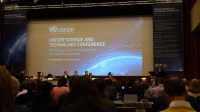
Throughout several landmark UN agreements adopted in 2015-16, including Sendai Framework, 2030 Sustainable Development Goals (SDGs), Paris climate agreement and New Urban Agenda (Habitat III), health is recognised as an outcome and a goal of disaster risk reduction. The broad intersection of health and disaster risk reduction is captured in the concept of H-EDRM, which encompasses various fields.
The focuses of H-EDRM research include:
- an all-hazards approach that incorporates the full spectrum of hazards;
- a holistic all-needs approach, including physical, mental, and psycho-social health and wellbeing;
- research and interventions facilitated during all phases of a disaster;
- disaster risk identification for populations with specific health needs such as children, people with disabilities, and the elderly; and
- research on and the building of health resilience in all communities.
CCOUC has published papers mapping out research development under H-EDRM. Another key research project also investigated the local disaster health risk perception and household preparedness in Hong Kong.
